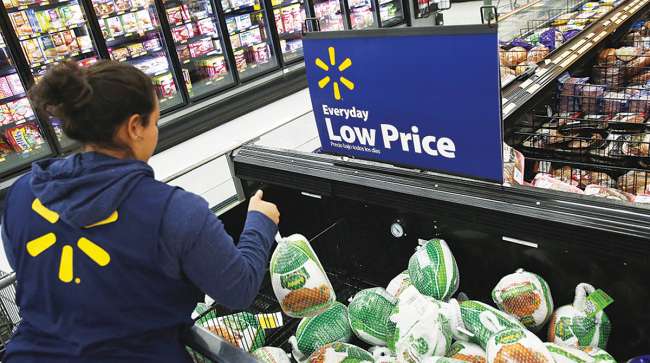Walmart Rises After Strong Start to Year, but Tariffs Still Loom

Walmart Inc. rose after reporting sales that met analysts’ expectations. Still, concerns are growing that Chinese tariffs could soon force the retailer to raise its famously low prices or sacrifice its bottom line.
Comparable sales for Walmart stores in the U.S. climbed 3.4% in the first quarter, its best for the period in nine years. Sales of groceries, Walmart’s biggest business, fueled the increase, and a later-than-usual U.S. flu season boosted health and wellness products. The shares rose 2.5% in premarket trading May 16 in New York.
“This is a very good set of results,” Neil Saunders, an analyst at GlobalData Retail, said in a note. “The U.S. operation remains the star of the show.”
Walmart ranks No. 3 on the Transport Topics Top 100 list of the largest private carriers in North America.
Web sales in the U.S. increased 37%, slightly ahead of the company’s expected growth rate for the full year. Walmart and rival Amazon.com Inc. are locked in a fierce battle for internet shoppers, and both have recently pledged to speed up delivery times. While Amazon has the overall lead in e-commerce, raking in about 50 cents of every dollar spent, Walmart has the best-developed web grocery business with 2,450 stores offering curbside order pickup.
Walmart’s online growth has come at a cost to profitability, though. Gross margins of 24.3% were in line with analysts’ estimates but did mark a slight year-on-year contraction. That can be attributed to higher labor costs, plus online sales that typically deliver lower margins than in-store sales. Transportation expenses, meanwhile, have eased somewhat this year, the company said.
On the down side, Sam’s Club’s same-store sales fell short of estimates, dragged down by reduced tobacco sales.
Tariff Concerns
Investors also remain on edge about tariffs, as shown by Macy’s Inc. on May 15: Shares of the department-store chain fell sharply after the chief executive officer said its customers likely will see higher prices.
Walmart’s response to potential higher levies will likely set the tone for other discount retailers, and its decisions on whether to pass along or absorb the additional costs will have ripple effects on American consumers. In its favor, Walmart’s clout with suppliers gives it more room to maneuver, and much of its food comes from U.S. sources, easing the impact.
“We will do everything we can to keep prices low but increased tariffs lead to increased prices,” Chief Financial Officer Brett Biggs said in a May 16 interview. “It’s very item- and category-specific. There are some places where as we get tariffs, we will take prices up.” Shifting sourcing “is one of a number of actions that our merchants are considering.”
Tariffs, according to Evercore ISI analyst Greg Melich, are “the next key swing factor,” as they could “wipe out” earnings growth across the sector this year.




